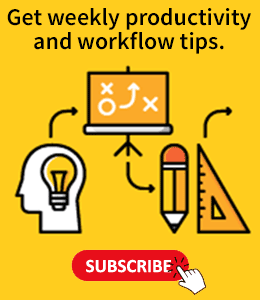Ideas to Bring to Every Meeting
By Deanna deBara ![]() | Published April 29, 2021
| Published April 29, 2021
When you attend a meeting, you want to show up prepared to participate and make the most out of the time you have with your team, managers, and coworkers—and that means showing up with ideas.
But while some ideas will only apply to specific meetings, other ideas make for better meetings across the board. For example, ideas about how to manage a current project would make the most sense during a project-related meeting, while ideas around how to forge a better working relationship with your supervisor would be best discussed during a 1:1. And if you want to make the most out of your professional sit-downs, you should bring your best ideas to every single one.
So, the question is—what exactly are the ideas you should bring to every meeting?
Ideas about how to make the meeting more efficient
Today’s workforce spends a lot of time in meetings. According to data from leading career resource The Muse, 15 percent of an organization’s collective time is spent in meetings—a number that has steadily increased every year since 2008.
But unfortunately, for all that time spent in meetings? Much of it is not time well spent. Leaders consider nearly 70 percent of meetings failures—often because meeting attendees are completely disengaged (a whopping 92 percent of employees admitted to multitasking during meetings, with 41 percent multitasking “often” or “all the time”).
So, because you and your team are spending so much time in meetings—and because so many of those meetings are wildly unproductive—one of the best types of ideas you can bring to the table? Ideas about how to make each meeting (and meetings in general) more efficient.
For example, if you find yourself and your coworkers spending a solid portion of every meeting checking emails or responding to Slack messages on your phones, you may suggest a “no phone” policy for meetings. If you notice the first 15 minutes of every meeting is spent trying to get everyone on the same page, you might recommend sending out more detailed meeting agendas.
The point is, for all the time you spend in meetings, you want that time to be productive and efficient—so make sure you’re sharing plenty of ideas about how to make that happen.
Ideas about where you—and your team—are succeeding
If you’re like most people, you want to be recognized for the work you do. According to research outlined in TechCrunch, nearly 70 percent of employees say they would work harder if they felt their efforts were better recognized. And according to research outlined in Forbes, recognition is the number one thing employees say their manager could give them to inspire them to produce great work—even more than a salary bump, promotion, or additional training.
Being recognized for a job well done can make for a better, more engaged work experience—both for yourself and for your coworkers. And a great way to make sure that recognition happens on a regular basis? Bring it up at meetings.
Before your next meeting, brainstorm ideas around where and how you, your colleagues, and your team as a whole are succeeding. For example, did your team knock your quarterly sales goal out of the park? Did a coworker go above and beyond to make sure a project was delivered on time? Did you recently cross the five-year mark of work for your company? Bring those accomplishments to your next meeting and share them with your team—and encourage your coworkers to do the same.
Using meetings as a platform to celebrate wins and share ideas about how, where, and in what ways you and your colleagues are succeeding can help everyone feel more recognized and appreciated—which will ultimately make for a happier, more engaged team.
Ideas about what to eliminate
Thinking about new ways to approach a problem can be a great way to innovate. But sometimes, the best way to solve a problem is to eliminate some of the approaches you’re already taking.
A recent study outlined in Nature found that most people have a bias towards additive solutions vs. subtractive solutions. Or, in other words, people are much more likely to suggest ways to solve a problem by adding something than by taking something away.
But subtractive solutions are often more effective than additive ones; for example, eliminating an outdated or unnecessary system or process can often do more to boost team productivity than adding a new process.
At your next meeting, brainstorm ideas around things that aren’t working and what you can eliminate to solve a problem and increase efficiency—whether that’s an issue with your current workflow, team structure, or product. For example, let’s say your team is trying to figure out a better way to collaborate while working remotely. Instead of suggesting a new software or solution, bring ideas about what you can eliminate to improve remote collaboration—like getting rid of a file-sharing process that makes collaborating on documents tedious and time-consuming or cutting down the number of all-team meetings each week so individual contributors have more time to work together on projects.
Not only can your ideas help make your team (and yourself!) more efficient and better at solving problems, but sharing your own subtractive solutions could inspire your coworkers to do the same; according to the Nature article, “the reason their participants offered so few subtractive solutions is not that they didn’t recognize the value of those solutions, but because they failed to consider them...when participants had more opportunity to think or practice, the likelihood of offering subtractive solutions increased.”
Use these ideas to make the most out of meetings
Meetings take up a lot of your time at work. But when you bring these ideas to every meeting, you’ll show up with everything you need to make the most out of your meetings—and boost productivity, efficiency, and overall engagement in the process.
Tags
meetings productivity email focus organization
Categories
Productivity Tips

Deanna deBara
Deanna deBara is an entrepreneur, speaker, and freelance writer who specializes in business and productivity topics. When she's not busy writing, she enjoys hiking and exploring the Pacific Northwest with her husband and dog. See more of her work and learn more about her services at deannadebara.com.


